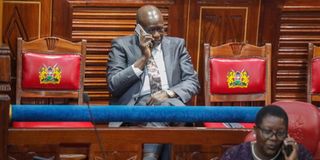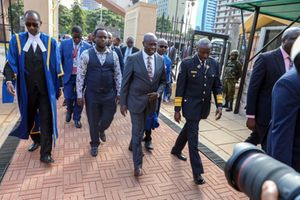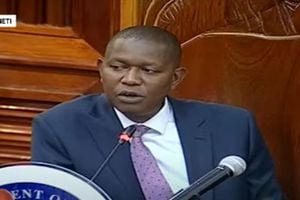
Deputy President Rigathi Gachagua arrives at the Senate for the second day of his impeachment trial.
Should the Senate confirm impeachment of Deputy President Rigathi Gachagua today, the battle is likely to move to courts that could reinstate him in office - if he establishes sufficient grounds - until determination of the petition.
It could rekindle the fierce legal battles witnessed in the past where governors have successfully stayed in office despite Senate verdict to impeach them.
Mr Martin Wambora was impeached by the Senate as Embu governor but served out his term until 2017, and secured re-election, and most recently, Meru governor Kawira Mwangara is still in office despite impeachment by the Senate courtesy of court intervention.
In the case of Mr Gachagua he has opted to soldier on, banking on the judiciary to get fair hearing in the ongoing ouster process, where the Members of the National Assembly by resolution, approved a vote of no confidence against him with 282 votes against 44.
The senate, the trial chamber, is equally expected to either substantiate the 11 charges levelled against the DP in a special motion by Kibwezi West MP Mwengi Mutuse, or dismiss them.
The besieged DP has consistently expressed confidence in the Judiciary signaling he is prepared to fight all the way to the Supreme Court, a protracted legal battle that could even drag on to the end of their term with President Ruto.
His legal team, through numerous cases that were initially lodged to try scuttle parliamentary proceedings, gave pointers to his likely defence in court.
Central to the petitions is raising doubts on the process including poking holes on the public participation done on the impeachment proceedings.
The DP’s legal team contends the public hearings were not extensive and that the forums should have incorporated Mr Gachagua’s defence so that the public can make an informed choice.
Another argument is that the charges lack merit as they are not backed with solid evidence to meet the threshold to impeach a deputy president.
Mr Gachagua maintains that they were voted in as a joint ticket with President William Ruto and he should not be ejected from office by a few MPs based on trumped up charges.
The developments in the Senate where Mr Gachagua’s legal team has poked holes on testimony by the prosecution witnesses has given the deputy president the confidence that he would have a strong case in the courts in the event the Senate impeaches him.
“We have high hopes in the judiciary. Our judiciary is very professional and I have no doubt in my mind that our eminent judges will protect the constitution and the rule of law and make always make use the will of the people is sovereign,” said the DP in Embu last Sunday.
Although the impeachment trial in the senate is a political process, it is historic as it seeks to determine whether the vote of confidence by the National Assembly meets the threshold for removal from office.
If the Senate overwhelmingly votes against Mr Gachagua, President Ruto as per Article 149 is expected to nominate a new DP and submit the name to the National Assembly within 14 days, a matter concluded in 60 days.
In a bid to fight his ouster, the DP will only have the option to seek legal redress to stop the gazettement of the senate resolution and declaration of vacancy in the office of the DP by Speaker Amason Kingi, by squashing the impeachment proceedings in the bicameral House.
Mr Gachagua through his legal team, has mounted a fierce defense in court, seeking conservatory orders to halt his impeachment in parliament, which have all been unsuccessful.
The legal route could be the saving grace for the DP, if the High court stays the Gazettement of the removal from office, mirroring the previous cases.
The courts have in previous judgments set jurisdictions in regards to past removal from office cases against governors Martin Wambora (Embu), Sonko, Amb Mohamed Abdi Mohamud (Wajir) and now Meru governor Kawira Mwangara.
In Mr Mohamud case, he was in the cold for a while before the impeachment was reversed, in a historic judgment after he secured court orders to suspend the Senate decision and the Gazettement and swearing in of his deputy Ahmed Ali Muktar.
Presiding Judge Patrick Otieno and Justice Wamae Cherere ordered the ousted governor to be reinstated on public participation violation and his right for fair administrative action and fair hearing as provided in Articles 10, 47 and 50 of the constitution and the County Governments Act and the Standing Orders of the county assembly.
During Mr Wambora tenure, the Senate upheld his impeachment twice but he thwarted the planned swearing in of his deputy Dorothy Nditi, when he secured stay orders from a Kerugoya court. He went ahead to secure a second and final term in office.
The matter sparked off fights between the Judiciary and the legislatives, leading to Speakers rulings on the separating of powers amid claims of judicial activism.
In his ruling, National Assembly Speaker Justin Muturi in 2016 delivered his reasoned position on the separation of powers, where court cannot injunct parliament and vice versa, once the courts are seized of a matter, parliament will allow it to be concluded.
Senate has in the past played by this cardinal rule, after the Parliamentary leadership under Mr Muturi and former Senate Speaker Ekwee Ethuro and the Judiciary led by former Chief Justice Willy Mutunga held in a meeting held at Winsor Gold hotel and county club to agree on the ground rules.
In this regard, MPs has stayed away from considering matter already in court as it subjudice. This could explain why the judges have been reluctant to give orders halting the impeachment case in parliament.
Read: Road to replacing a DP: What happens until swearing in
In light of this, the Supreme court also weighed in on the matter in the judgment of Mr Sonko case vs county assembly of Nairobi City and 11 others petitions.
“It must, however, be stressed for avoidance of doubt, that the power of impeachment, removal or recall is not one expected to be in constant or frequent exercise. It is only in the face of credible evidence of extraordinary wrongdoing, that the conduct of a State officer will be investigated and even then, only upon sufficient proof of the allegations that impeachment, removal or a recall would be warranted,” reads the Apex court judgment in 2022, when Mr Sonko sought to overturn his impeachment as Nairobi governor.
The seven judge bench led by Chief Justice Martha Koome argued: “A State officer may be impeached or removed from office for, among other transgressions, gross violation of the constitution or of any other law; commission of a crime; abuse of office; gross misconduct; and violation of the constitution or any other law.”
The court noted the Constitution creates a distinctive category of members of society called State officers, who are regarded and idolized as special pedigree of leaders in the society; and to whom much is given, and therefore much is required and expected.
They include, the president, DP, Cabinet Secretary (CS), MP, Judges, Magistrates, members of a commission to which Chapter fifteen applies, MCA, governor, DG, or other executive committee members, AG, Director Public Prosecution (DPP), secretary to the cabinet, Principal Secretary (PS), Chief of Defence Forces (CDF), Director General (DG) National Intelligence Service (NIS), Inspector General of Police and the two deputies.
This is where the DP falls as he ticks the boxes, similar to mr Sonko’s impeachment grounds.
Still in the case of Sonko, Constitutional and Human Rights Division, of the High court, a three judge bench comprising Said Chitembwe, Weldon Korir and Wilfrida okwany noted, “holder of such an office is expected to carry himself with dignity, humility, integrity, comportment and respect for others.
They argued that where a governor fails to meet those standards, his stay in office is no longer tenable and the county assembly and the Senate can invoke the impeachment remedy.
Governor Kawira’s impeachment is also testing new legal grounds, with a 2019 law that was to solve transition chaos as the court determines the case.
Similarly, the courts have held impeachments of ex governors Mike Sonko (Nairobi) and Ferdinand Waititu (Kiambu) by county assemblies and the senate were done in compliance with the constitution and the law.





